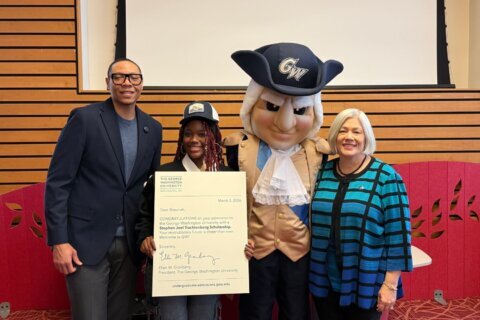WASHINGTON — Are ghosts real?
A panel that included scientists took on that question Wednesday night at the Capital Yacht Club, in D.C.
Ghost-hunting TV shows claim to show evidence of such spirits, and people who use Ouija boards think they may be getting messages from “the other side.”
But professor Marc Sebrechts, who chairs the Department of Psychology at Catholic University, says the brain is likely playing tricks on you.
“The power of the mind is incredible,” he said, adding that working as a group toward a common goal, such as trying to communicate with the dead, can be troublesome.
“One of the things we do know is that the frame in which you’re working is very important. That there’s a tendency, for example, for confirmation bias. People who, as a group, come together and think about something — they tend to confirm what they expect to experience.”
Neurologist and best-selling author Dr. Richard Restak explained the concept of the ideomotor response, in which people can make movements they’re not consciously aware of to confirm their beliefs or expectations.
He also says humans give off subtle cues that can influence others.
“We’re doing it all the time — we’re giving off clues about things that we don’t realize.”
Restak recalled going somewhere with his wife, who had mistakenly put on two shoes that were slightly different in color. Restak was sure no one would notice, but when they got to their destination, the host immediately looked down at his wife’s shoes. Restak realized later that he had unconsciously looked at the shoes first, causing the host to follow his cue.
Neither Sebrechts nor Restak believes in ghosts, but the third member of the panel, Las Vegas mentalist Alain Nu, does.
“I really didn’t believe in ghosts, and really didn’t think about it too much until about, maybe, five years ago, when I experienced something really strange,” he said.
“I feel that science tries to explain what it’s all about, and I feel that it’s doing the best that it can, but I feel that there’s something really weird going on, and I’m not sure if that is just our imagination getting the best of us or if it’s something much deeper and maybe more profound.”
As part of the event, Nu demonstrated he can bend a spoon without seemingly touching it.
The event was put together by the Molotov Theatre Group to coincide with their creepy-cool production of “The Margins,” which runs through this weekend at the D.C. Arts Center.
The show is based loosely on The Philip Experiment. Click here to watch a video with more information.








